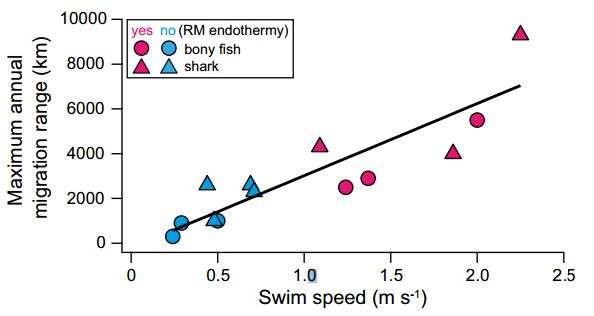April 21, 2015 report
Warm bodied fishes found able to swim farther and faster than cold bodied fish

(Phys.org)—A team of researchers with members from Japan, the U.S. and the U.K. has found that some warm bodied sharks and tunas are able to swim more than twice as fast non-warm bodied fish and they are also able to swim farther. In their paper published in the journal Proceedings of the National Academy of Sciences, the team describes how they used existing data along with new data they obtained by attaching sensors to several sharks in different locations around the world, to better understand endothermy in fishes and what their studies revealed.
Fish are generally thought of as cold-blooded creatures—their internal temperature matches the temperature of the water around them. But some species have been found to have internal temperatures higher than the water around them—sometimes as much as 20°C higher. Common sense suggests that a higher internal temperature must come at some cost, which of course would be the need to eat more food than cold bloodied sea creatures. The natural question then is, what benefit would a fish or shark receive as a result of having warmer insides? That was what the researchers with this new effort sought to learn.
To find out, they scoured the current literature and then conducted some field studies of their own, attaching sensors to some sharks that are known to be warm bodied. In analyzing the data from their work, they found that warm bodied sharks were able to swim on average 2.7 times as speedily as similar sized sharks that were not warm bodied—they also found that they were able to swim farther.
The researchers suggest warmer "red" muscle endothermy offers more power per pound for the sharks and other warm bodied fish, allowing for speedier acceleration and more staying power. In their experiments, they found that that the warm bodied sharks were able to swim long distances in a reasonably short amount of time, which they note, would allow them to take advantage of seasonal changes in different locales. It also might be a positive attribute as the seas warm. They suggest their study and results offer a plausible explanation for the evolution of endothermy in fish.
More information: Comparative analyses of animal-tracking data reveal ecological significance of endothermy in fishes, Yuuki Y. Watanabe, PNAS, DOI: 10.1073/pnas.1500316112
Abstract
Despite long evolutionary separations, several sharks and tunas share the ability to maintain slow-twitch, aerobic red muscle (RM) warmer than ambient water. Proximate causes of RM endothermy are well understood, but ultimate causes are unclear. Two advantages often proposed are thermal niche expansion and elevated cruising speeds. The thermal niche hypothesis is generally supported, because fishes with RM endothermy often exhibit greater tolerance to broad temperature ranges. In contrast, whether fishes with RM endothermy cruise faster, and achieve any ecological benefits from doing so, remains unclear. Here, we compiled data recorded by modern animal-tracking tools for a variety of free-swimming marine vertebrates. Using phylogenetically informed allometry, we show that both cruising speeds and maximum annual migration ranges of fishes with RM endothermy are 2–3 times greater than fishes without it, and comparable to nonfish endotherms (i.e., penguins and marine mammals). The estimated cost of transport of fishes with RM endothermy is twice that of fishes without it. We suggest that the high energetic cost of RM endothermy in fishes is offset by the benefit of elevated cruising speeds, which not only increase prey encounter rates, but also enable larger-scale annual migrations and potentially greater access to seasonally available resources.
Journal information: Proceedings of the National Academy of Sciences
© 2015 Phys.org




















